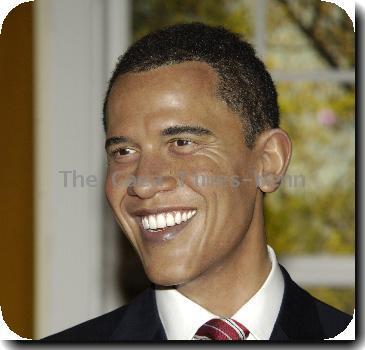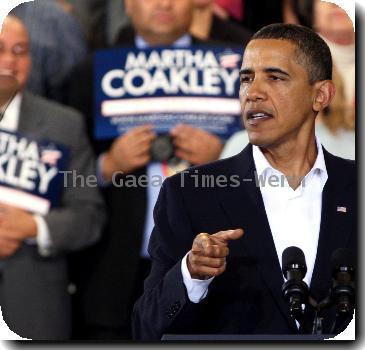Democrats’ early optimism of gains in California yield to worry about losing seats to GOP
By Samantha Young, APSunday, February 28, 2010
Democrats’ Obama bounce in California disappearing
CERES, Calif. — Kent Hancock can’t remember tougher economic times in the two decades he’s sold used cars in California’s Central Valley.
He brings home less than half the money he cleared a few years ago and has dipped into savings to keep his business open. Hancock, 41, blames politicians for doing too little to get the economy back on track and hopes they are “sweating it a little bit. They should. It shouldn’t be a guaranteed job.”
Hancock’s frustration is evident throughout the nation’s most populous state. Just a year ago, the Democratic Party looked at California as a base for adding to its majorities in Congress. Now, it could be a the place where it loses them.
Even Democratic Sen. Barbara Boxer, widely viewed just six weeks ago as a shoo-in for re-election to a fourth term, now faces the toughest race in her 28 years representing California in Congress.
That was before Republican Scott Brown’s upset last month in Massachusetts took from Democrats the seat held for nearly five decades by Edward M. Kennedy, who died last year. Kennedy, like Boxer, was one of the Senate’s most stalwart liberals.
“Every state is now in play,” Boxer warned fellow Democrats after Brown’s victory.
Democrats hold both of California’s U.S. Senate seats and 34 of its 53 seats in the U.S. House. A year ago they were looking to pick up as many as eight more from Republicans in districts that President Barack Obama won in 2008.
That list of takeover targets has now been winnowed down to three: GOP Reps. Dan Lungren in Sacramento, Mary Bono Mack of Palm Springs and Ken Calvert of Corona, in Southern California.
Republicans, meanwhile, have expanded their takeover list.
Rep. Kevin McCarthy, who’s recruiting Republicans to challenge incumbent California Democrats, said he has no worries that the GOP will lose any of the House seats it now holds in the state. Democrats, he said, will have to focus on keeping seats in perennially competitive districts in other states.
“They have too many of their own members playing defense and needing money,” McCarthy said.
McCarthy named four California House Democrats on the GOP’s target list: Jerry McNerney of Pleasanton, who represents a district in which Republicans are a majority; Loretta Sanchez of Garden Grove, who faces a Republican challenger seeking to motivate the district’s growing Vietnamese population; and Jim Costa of Fresno and Dennis Cardoza of Atwater, who represent agriculture-dependent districts decimated by high unemployment.
McNerney faces competition no matter the election year. His district stretches from the wealthy and slightly left-leaning suburbs of the eastern San Francisco Bay area to more conservatives suburbs and farming communities in the San Joaquin Valley.
Sanchez’s district is in a part of Orange County that leans Democratic but voted for former President George W. Bush in 2004 and Republican Gov. Arnold Schwarzenegger in 2006. It has a large Vietnamese-American population. “They come out and vote in large numbers, and they’re 2-to-1 Republican,” says her opponent, state Assemblyman Van Tran.
The fates of Costa and Cardoza, whose districts are in California’s Central Valley, will depend largely on the region’s economy. Unemployment in some parts of the valley, where much of the nation’s food is grown, has soared beyond 30 percent. Richard Avilla, 59, who lives in Cardoza’s district, is about to be unemployed himself. He is closing his office supply store in nearby Turlock.
“Things aren’t going well. Regardless of whether it’s a Democrat or Republican, they better be worried because they are doing their jobs and failing,” Avilla said.
Freking reported from Washington.
Tags: Barack Obama, California, Ceres, North America, Political Organizations, Political Parties, United States, Voting Districts



